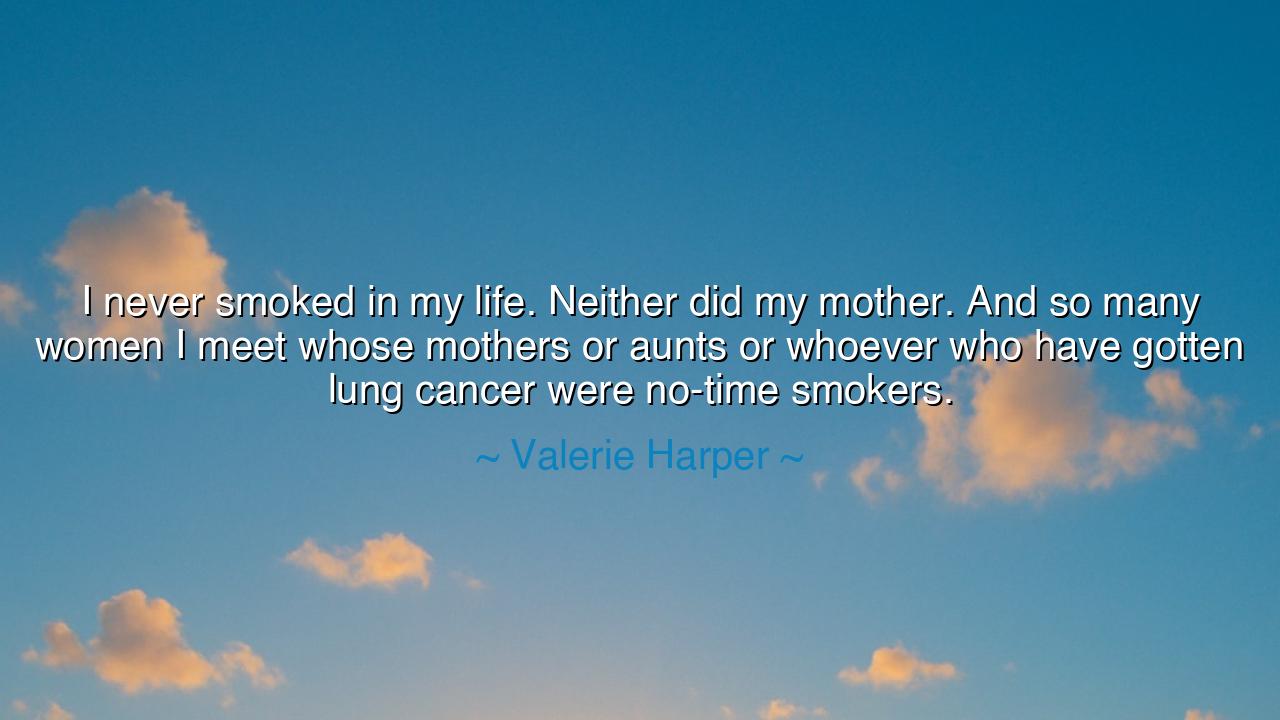
I never smoked in my life. Neither did my mother. And so many
I never smoked in my life. Neither did my mother. And so many women I meet whose mothers or aunts or whoever who have gotten lung cancer were no-time smokers.






Valerie Harper, with the strength of a seasoned warrior of truth, declared: “I never smoked in my life. Neither did my mother. And so many women I meet whose mothers or aunts or whoever who have gotten lung cancer were no-time smokers.” In these words lies not merely a lament, but a warning. She reminds us that fate does not always bow to choice, that illness sometimes falls upon the innocent, untouched by the poisons of smoke or fire. Her testimony reveals the mysterious cruelty of disease, which may descend not only from actions taken, but from shadows unseen, borne of air, of inheritance, or of the silent workings of time.
This utterance is a cry against the illusion that only the reckless suffer. Many believe that lung cancer is the curse of those who inhaled smoke willingly, yet Harper unveils the harsher reality: it strikes also the pure, the careful, the watchful. Thus the ancients would say: the arrow of misfortune does not always follow the path we think, but flies where it wills. The innocent must not be shamed, nor their suffering dismissed, for their pain is proof that calamity respects no boundary of guilt.
History offers us countless mirrors to this truth. Think of Pericles, the mighty statesman of Athens, who lived with discipline and foresight, yet was struck down by the plague that ravaged his city. He did not summon it by vice, nor call it forth with folly, yet it consumed him. In the same way, the mothers and daughters Harper speaks of did not draw the smoke into their lungs, yet the unseen winds of fate bore disease into their bodies. Their stories echo Pericles’—the lesson that virtue or restraint alone does not always guard against life’s storms.
And yet, there is no despair in Harper’s voice alone—there is also courage. By proclaiming her innocence of smoke, she does not seek pity but insists upon recognition. She speaks for the countless who are too often unheard: women who suffer without ever tasting the vice that is blamed for their suffering. It is as if she stands upon the stage not merely as actress, but as herald, calling future generations to look deeper, to search the hidden roots of illness, and to offer compassion where ignorance once cast judgment.
Let this teaching be carried forward: do not measure the worth of a sufferer by the supposed cause of their pain. Whether smoker or no-time smoker, every life deserves dignity, every struggle deserves remembrance. And may her words awaken us to seek not only cures for the body, but justice for the spirit—so that those who suffer without cause may be honored, and those who assume may learn to see with kinder eyes.






NKDuy Nguyen khanh
Harper’s observation on lung cancer in non-smokers raises the question of how we view cancer prevention. If smoking isn’t always a contributing factor, what are the other hidden risks? Could this shift how we approach cancer awareness campaigns, and should we consider other lifestyle factors or genetic predispositions that might also play a role in developing the disease?
TTThanh Tran
It’s striking that Valerie Harper highlights how many women with lung cancer were never smokers. This makes me wonder if there’s enough support for people who develop lung cancer under these circumstances. How can healthcare systems better identify and treat lung cancer in non-smokers, especially when it might not be as widely recognized as a risk factor?
TATFBOYS Ai
This quote brings attention to an often overlooked aspect of lung cancer, where even non-smokers, particularly women, are affected. Does this point to a need for greater education on the different causes of lung cancer? Could it be that second-hand smoke or other environmental factors are playing a more significant role than we realize?
NNnguyen ngoc nhi
Valerie Harper’s statement raises an important point about lung cancer, particularly in non-smokers. It challenges the common belief that only smokers are at risk. How can we raise awareness about the risks of lung cancer for those who have never smoked? Should there be more research into environmental or genetic factors contributing to the disease in non-smokers?